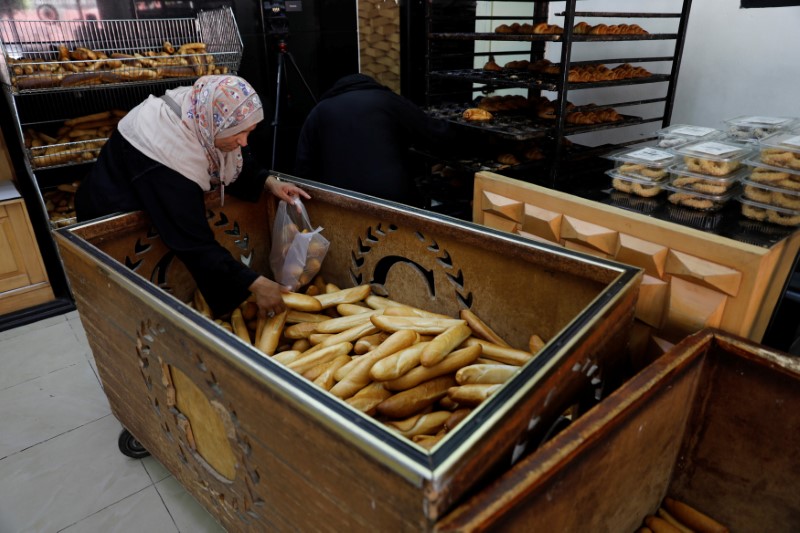By Ahmed Elumami and Ayman al-Warfalli
TRIPOLI/BENGHAZI, Libya (Reuters) - Libyans already struggling to make ends meet have been hit by sharp increases in bread prices, as a broken imports system and political splits lead to more inflationary pressure for ordinary citizens.
Bread is a staple for Libyan families.
But two weeks ago bakeries in the capital Tripoli abruptly closed, explaining to puzzled customers that they had been forced to shut due to high flour and oil prices.
When they reopened they posted apologetic notes pricing three small loaves at one dinar, which before had bought eight.
"God only knows how bad the situation is," said Khayriya Zegheit, a 54-year-old housewife, shopping with her family in a Tripoli bakery.
"Sometimes when I want to make a sandwich for my son it's half a loaf where it used to be one loaf. Some days we do not buy bread ... Some days I have to buy using checks, but they will not give bread against checks."
Oil-rich Libya, with a population estimated at just 6.5 million, was once one of the wealthiest countries in the region. Before the 2011 uprising that overthrew Muammar Gaddafi lavish subsidies meant one dinar bought 40 loaves of bread.
But the revolt splintered Libya into rival factions that have fought over power and oil revenues. Economic woes accelerated after 2014, when competing governments, parliaments and central banks were set up in Tripoli and the east following disputed elections.
Prices of basic goods have been volatile, in line with sharp swings in the value of the Libyan dinar on the parallel market.
The gap between the fixed exchange rate of 1.4 dinars to the dollar and the black market rate widened after Libya's foreign currency income from disrupted oil production fell. One dollar currently buys around seven dinars on the parallel market.
IMPORT SCAMS
Some of those given dollars for imports at the official rate cash them in illegally, leaving scarce funds for bringing essential goods into the country.
Inflation has been running close to 30 percent, and a collapse of confidence in the banking system, which is partly controlled by armed groups, has led to an acute liquidity crisis.
Some 1.1 million people require humanitarian assistance, according to the United Nations.
"After the price rises for foodstuffs and meat, the salary is not enough," said Ahmed Ali, a government employee shopping in Benghazi, Libya's second city. "When you go to the bank they don't give you your full salary, and they only have cash every three or four months."
Benghazi traders and officials blame political divisions and the weakness of the dinar for sharp price increases since last year.
"The reason for the rise in the price of bread is the lack of regular access to subsidized flour," said bakery owner Ali Khaled. "We have to buy from the black market."
Jamal al-Sheebany, the Tripoli-based head of Libya's state-run Price Stabilisation Fund, said only the state could guarantee fair and stable bread prices, but the fund had not been allocated money for supplying wheat or flour for the past three years.
"Since the state was incapable of filling the subsidy gap due to a decrease in oil revenues, the matter was left to the private sector," he said.
"Nobody is taking responsibility and nobody is being held accountable."
